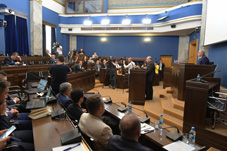President of National Bank presents annual report to Budget and Finance Committee
By Nika Gamtsemlidze
Wednesday, June 12


According to Gvenetadze, the main task of the NBG is to ensure the price stability, supporting the transparency of the financial system, as well as sustainable economic growth of the country.
Gvenetadze stressed that one of the main priorities is increasing Larization, as the Larization represents precondition of decreasing the macro risks and increasing sustainability towards foreign vulnerabilities.
One of the most important priorities he talked about is to actively inform the public society about the current processes and the expected results in the economy, the policies implemented by the National Bank of Georgia and its impact on the country’s economy.
According to the report, 2018 was an important year for foreign sector activity, in particular for export revenue, tourist revenues, and money transfers. As the President of NBG said, it was also a crucial year in terms of accumulation of reserves. Last year also marked as a beginning of supervising the non-banking financial institutions. Also, NBG has started to work more actively to cope with the growth of consumer loans in the country.
As the report says, in 2018, the bond market was significantly activated. As initiated by the president of NBG, 2018 was named as the “Year of Financial Education.”
Gvenetadze also noted that the work of NBG received positive reviews by international organizations during 2018, and relevant awards were given for successful activities in many different directions.
After presenting the report, the MPs had the opportunity to ask more questions regarding the activities of NBG.
Answering the question about the national currency and NBG’s policies, Gvenetadze said that the policy that the NBG is trying to carry out ensures that the “exchange rate of the Georgian Lari becomes more stable.” As he said, this will help the investment environment to become more competitive.
While trying to stabilize the exchange rate, NBG has filled foreign-exchange reserves with 30 000 000 dollars. As Gvenetadze explains, to ensure a stable exchange rate, it is crucial that the Central Bank has sufficient reserves to avoid potential risks.
“If you look at the estimates of the International Monetary Fund (IMF), with the reviews of its Managing Director and Chairperson Christine Lagarde, you will see clearly that the policy that the National Bank is making is very well received.”
Gvenetadze also talked about the case of TBC Bank's transactions carried out in 2007-2008. Because of this transaction, NBG has fined TBC Bank and the prosecutor's office is investigating the case.
“The process of money laundering is complicated, it is not easy; therefore, every violation of law may not be money laundering. The court will determine if the money laundering happened or not,” said Gvenetadze.
NBG is the central bank of Georgia. Its status is defined by the Constitution of Georgia. The main objective of the National Bank is to ensure price stability. According to the Constitution of Georgia, the National Bank is independent in its activities. The members of Georgia’s legislative and executive bodies do not have the right to intervene in the NBG’s activities.
Koba Gvenetadze is the president of the NBG and was appointed to the position in 2016.
